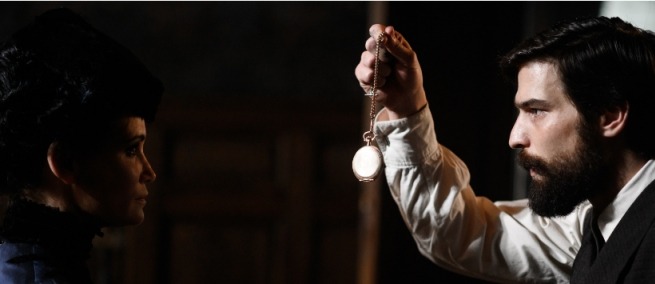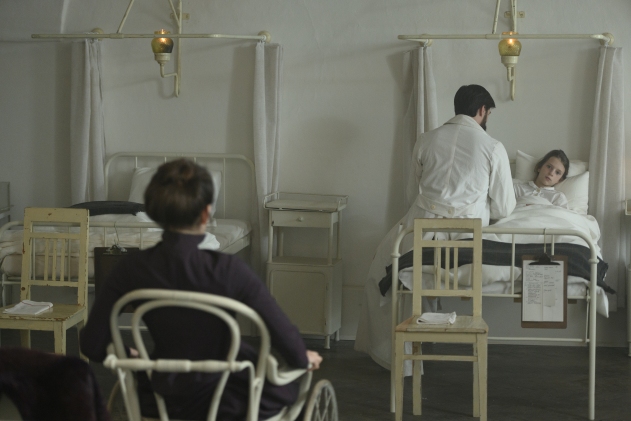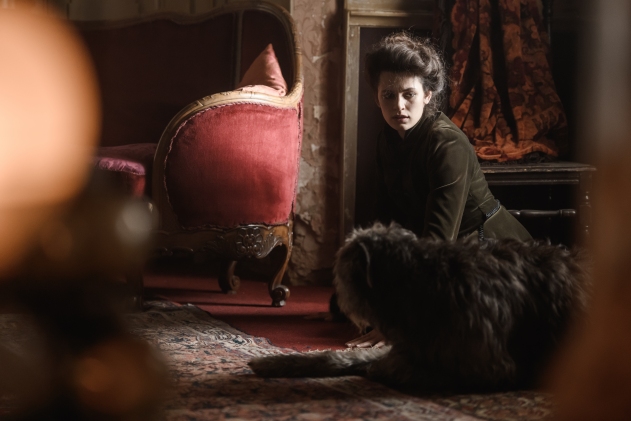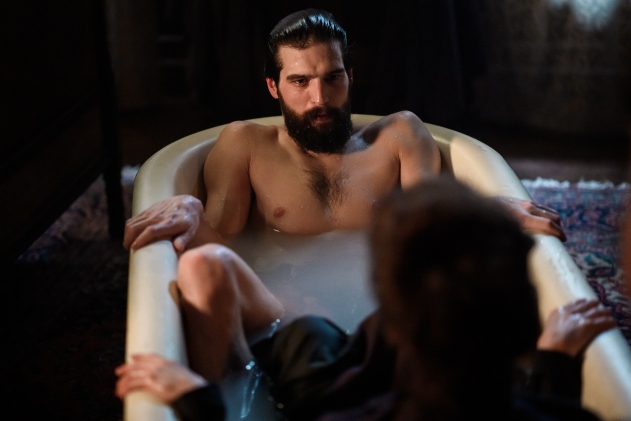
The new Netflix series FREUD, which made its world premiere at the 2020 Berlinale and is now streaming on Netflix, engages with a little-known part of Sigmund Freud’s biography: his experiments with hypnosis, which led him to invent psychoanalysis. FREUD is set in the 1880s when Sigmund Freud is still finding himself, and before he is revered for his contributions to understanding the unconscious. In fact, he is viewed predominantly as an outsider by the medical and scientific establishment.
The series, created and directed by Marvin Kren (4 BLOCKS), is a fictional re-imagining of where Freud’s diverse interests lead him—namely into murder, mystery, and the occult. Nevertheless, the filmmakers enlisted the help of a psychoanalytic consultant, Dr. Juan José Rios, who helped both the director and main actor Robert Finster learn about hypnosis as Freud would have performed it.
Dr. Rios is a hypnotherapist, psychoanalyst, and training analyst at the Austrian Ministry of health and a lecturer and training analyst at Sigmund Freud University Vienna. He is one of the foremost experts on the history of Freud’s involvement in hypnosis. We spoke with Dr. Rios about hypnosis and his work on the series.
Science & Film: Why was the series FREUD interesting to you?
Juan José Rios: This series was interesting because I know about psychoanalysis, but I know also about hypnosis. When Freud was 30, he had come back from France and he was learning hypnosis. The series is trying to show how it’s going, how many problems he has–in the society, in the hospital, with Theodor Meynert [Freud’s teacher and director of the psychiatric clinic where Freud was working], and with his colleagues–because hypnosis at this time was very difficult.
S&F: Can you explain a bit how psychoanalysis and hypnosis relate?
JJR: Freud had his first contact with hypnosis here in Vienna, when he was a student. He wasn't very happy with his studies in medicine. When he was in Paris, he had his first contact with Jean-Martin Charcot [a neurologist working with hypnosis and hysterical patients], and he was very fascinated by how Charcot was working. He was working at the Salpêtrière Hospital and he had about 3,000-5,000 hysterical patients. Freud tried to get more contact with Charcot and to learn about hypnosis, but he discovered that he didn't have the ability to hypnotize all his patients.
Freud was working in the hospital in Vienna and his boss Meynert—you can see this in the series—he can’t accept that Freud thinks about the unconscious.] [Meynert] thought, if you are sick, it is because your body is not correct. You have to do something for your body. Freud said no, it is not the body, but the soul.
When Freud showed how he did hypnosis and the symptoms of the patient disappeared or changed, people didn’t believe it. This is the deeper history of psychoanalysis. With hypnosis, Freud tried to show that there is more than the body: the unconscious. In this series, you can see many times how the unconscious works.

Production Still. Freud at the Vienna Hospital.
S&F: One of the things that the series made me think about is the false duality of mind and body; the mind is also the body, and so the unconscious can manifest itself in the body. That seemed to also be what Freud in the series was trying to point out to people: that he could actually cure the body by paying attention to the mind. Does that sound right to you?
JJR: It is exactly that. You can see the reaction within the body. For example, in psychosomatic medicine you can see that people have pain, people suffer with symptoms, but they don't think it is a problem of my soul, of my spirit. People say, I have a physical problem, not a mental problem.
S&F: The series is a reinterpretation of history, but from a historical standpoint, did Freud remain interested in hypnosis for the remainder of his career, or did he push that aside at a certain point?
JJR: Freud worked with hypnosis for a long time. The problem that he had was that he was not very confident with hypnosis. I also have to say that modern hypnosis is something different from what Freud practiced. In the 1880s, as you can see in the series, hypnosis was directive. There was a lot of body contact, especially with the front of the hands.
But Freud was sometimes very frustrated with hypnosis. He said, hypnosis is not good for all people. He decided not to use hypnosis anymore because [through hypnosis] the patients would give their symptoms up—they didn’t have any problems anymore, they were very happy, but after a time, symptoms would return. So, he said, we have to work more with these problems. And that became psychoanalysis. The only thing that stayed from hypnosis into psychoanalysis is the couch.

Production Still. Ella Rumpf as Fleur Salmoné.
S&F: Wow! I did not know that, that is fascinating. For the series, at what point in the show’s development did the filmmakers contact you?
JJR: The production came to me when they had begun to prepare. They had studied many years about the history of hypnosis and the history for Freud. I was very surprised when they came to me [that they] knew about the history. I wrote a book about psychoanalysis and hypnosis [so] I can express and show what the method is. They thought, there are not a lot of psychoanalysts in the world who know about hypnosis. The filmmakers said, what we need from you is the history about what is happening exactly, what problems [Freud] had, and how we can show that in this series. Part of my job was also to show to Robert Finster [the actor who plays Freud] how to do hypnosis.
They knew a lot about hypnosis, but [only] in theory. They came to me to really experience, what is hypnosis? With this experience, they were able to put into the series what hypnosis is and how it happens.
S&F: Did you hypnotize anyone?
JJR: Yes! The director Marvin Kren, Robert Finster, and Ella Rumpf [who plays Freud’s patient Fleur Salomé]. I worked especially with Robert. It was very interesting to see how he adapted his personality and movements when he was talking about Freud.
With Robert we worked constantly with hypnosis, different kinds of hypnosis, how he could do it. They wanted to have it as realistic as possible. I think Robert Finster is able to do hypnosis actually.
S&F: How do you think the show might affect how people think about Freud, or hypnosis, or psychoanalysis?
JJR: You have to see this question and this series as a part of the history. I get a lot of emails from colleagues who tell me that they are disappointed because the series is not what they expected. People were expecting Freud's biography. The series is not that; it is a part of the history of Freud, but it is not a Freud biography. People were expecting more psychoanalysis. It is not psychoanalysis because when Freud was 30 years old, psychoanalysis does not exist. It was this time when he began to discover more about the unconscious, and the time when he began to discover himself. He was very frustrated with medicine, and he had in this time a lot of economic problems—and also with Martha [his fiancée]. He wanted to marry her but it wasn’t possible because he didn’t have money. Mostly people know Freud after psychoanalysis, when he began to be very famous and present scientific theory, and to cure many people. This part of Freud is young Freud, and fewer people know about this.
When I talk to people, some people are very enthusiastic and find it fantastic because it’s a mix of psycho-thriller, psychology, hypnosis, alchemy, everything! But my psychoanalyst colleagues, they were waiting for something different. You have to remember that Freud is like a god for some people. He is an idol, everything that he does is perfect. I think Marvin Krem tried to present Freud not only like an idol, but like a person—with his strong and weak points. That makes it very interesting, because Freud is a normal person like you and me. That I find very nice.

Production Still. Robert Finster as Sigmund Freud.
FREUD is available to stream on Netflix. The series stars Robert Finster, Ella Rumpf, Georg Friedrich, Anja Kling, Philipp Hochmair, and Rainer Bock. Juan José Rios was the series’ psychoanalytic consultant.
All production stills by Jan Hromadko.
TOPICS